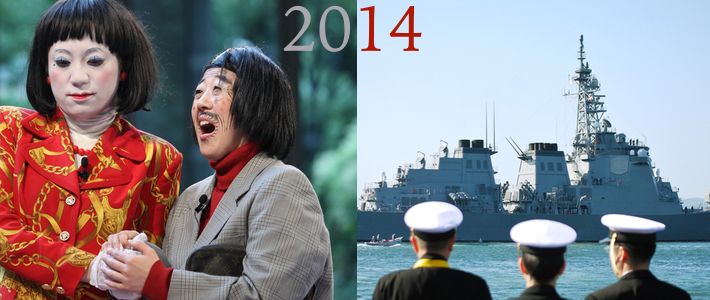
2014: The Winning Words
Politics Society Culture Lifestyle- English
- 日本語
- 简体字
- 繁體字
- Français
- Español
- العربية
- Русский
Today the publisher Jiyū Kokumin Sha announced its picks for the “Words of 2014.” Two terms shared the top prize this year: Dame yo. Dame dame, a “No way. No, no” phrase that catapulted comedy duo Nippon Erekiteru Rengō to televised fame during this year, and shūdanteki jieiken, or “right to collective self-defense,” which made its second appearance in a row on the list of nominees. The shared prize was a step down from last year, when an all-time high of four terms won the top ranking. (On November 19 we covered the full list of 50 nominees, if you want to see what else was in the running in 2014.)
The seven-member selection committee, also responsible for compiling the long list of nominees, commented on the reasoning behind their choices. Seigakuin University President Kang Sang-jung noted that “there were not so many flashy nominees as we saw in 2013,” describing the year 2014 as one when “a stern, stifling, all-kanji term like shūdanteki jieiken can carve out space for itself among the words on everyone's lips.” This take was echoed by ad campaign creator Yanai Michihiko: “There’s no denying that we had a small crop compared to the bounty that we saw in 2013, but in the end, that means we need to look back on 2014 as just this sort of year.”
The journalist Torigoe Shuntarō, meanwhile, connected the cowinners by stating: “The right to collective self-defense is a concept that will shape the very future of Japan . . . but this year, when a majority of the Japanese people stand against Abenomics and the Abe Shinzō administration’s moves to pass a state secrets protection law, interpret the Constitution to allow for collective self-defense, restart nuclear reactors, and move the Futenma US base to Henoko in Okinawa, what else can voters say but 'No way. No, no'?"
The Winners
ダメよ~ダメダメ — Dame yo. Dame dame. This “No way. No, no” catchphrase was popularized by the female comedy duo Nippon Erekiteru Rengō. The comediennes made their name with sketches in which a gaudily dressed, heavily made-up robot lover played by Hashimoto Koyuki would use the phrase to rebuff the sometimes amorous advances of her partner Nakano Sōko, made-up to look like an elderly gentleman.
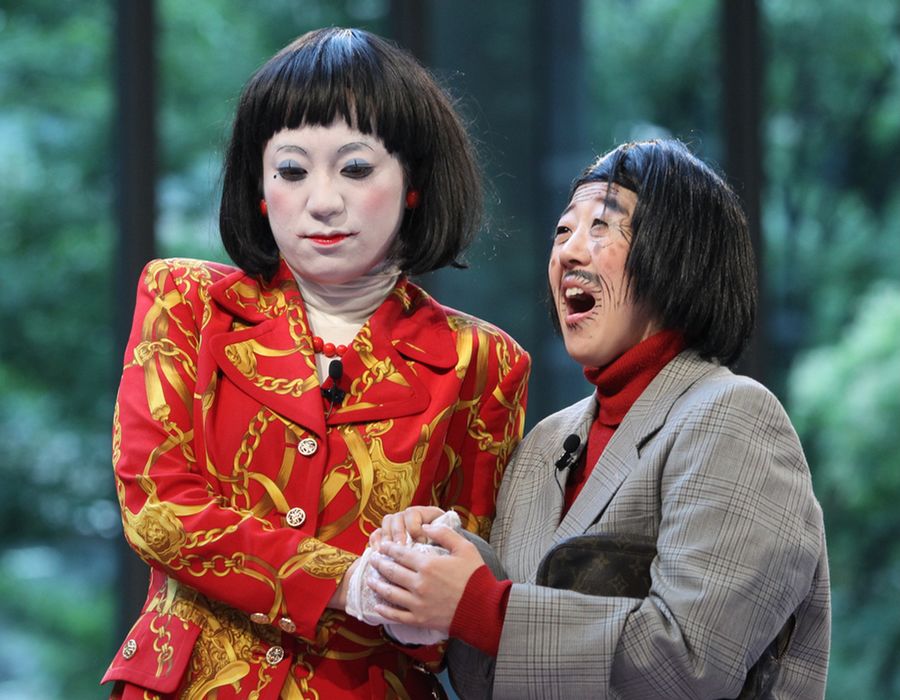 Hashimoto Koyuki (left) and Nakano Sōko won with their signature comedy phrase. (© Jiji)
Hashimoto Koyuki (left) and Nakano Sōko won with their signature comedy phrase. (© Jiji)
集団的自衛権 — Shūdanteki jieiken. Making a repeat appearance after showing up on last year’s list, the “right to collective self-defense” refers to Japan’s ability to engage in combat operations in support of allies that are under attack. Article 9 of Japan’s Constitution has traditionally been interpreted as disallowing this, but a July 1 resolution by the Abe cabinet set the stage for a new interpretation that would let Japan take on this role.
 The new constitutional interpretation could give Japan's Self-Defense Forces a more proactive role overseas. (© Jiji)
The new constitutional interpretation could give Japan's Self-Defense Forces a more proactive role overseas. (© Jiji)
The Runners-Up
ありのままで — Ari no mama de. “Just as I am.” This phrase featured in the chorus of the Japanese version of “Let It Go,” the theme tune to Disney’s hit movie Frozen. Takahashi Chikae translated the lyrics into Japanese and the track was performed by Matsu Takako. The tune was hard to escape in a year that saw Frozen-related publications and merchandise claw out a healthy share of the book and toy sales charts.
カープ女子 — Kāpu joshi. The “Carp girls” are young female fans of the Hiroshima professional baseball team. The Hiroshima Carp are the only Nippon Professional Baseball team without corporate ownership, and as such have had to be more creative in the marketing and merchandising fields to remain financially sound. It seems that this outreach has paid off in the form of more, and more fervent, women fans—not just in the home market of Hiroshima, but in the Tokyo area as well. Manga artist Ishida Atsuko’s Kyūjō ravāzu (Ballpark Lovers), originally published in 2010–11, gained fresh fans in republication for its tale of a high-school student who changes from a girl uninterested in sports to a rabid Carp fan.
壁ドン — Kabe don. “Pounding the wall” is traditionally what you do when the neighbor in your apartment complex turns the music up too late at night. This term’s other meaning, though, is the pose struck when (usually) a man puts his arm up on the wall next to (usually) a woman, the better to keep her in place while he sweet-talks her. This is a common visual trope in manga works in recent years, and one “idol” musical group gives its fans the chance to kabe don their favorite member at meet-and-greet events.
危険ドラッグ — Kiken doraggu. “Dangerous drugs” are some of the legal highs that can be easily procured online and from the nation’s “head shops.” Such substances were previously referred to as dappō doraggu, “loophole substances” skirting Japan’s famously strict drug laws, but in an effort to emphasize the risks carried by the use of such unregulated, poorly understood substances—which have caused drivers to lose control of vehicles, killing and injuring pedestrians—the official term was changed to this “dangerous” version in July 2014.
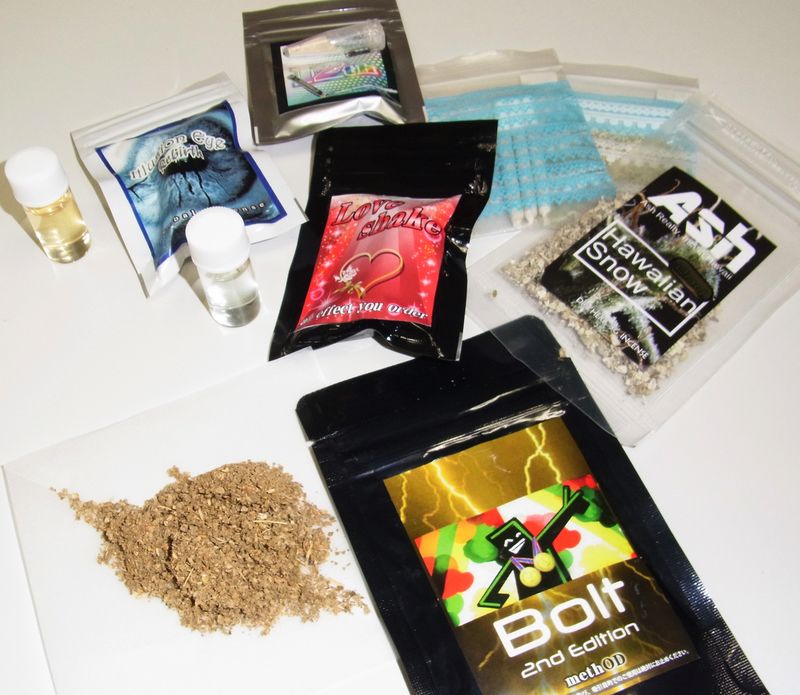 Though not technically illegal, these substances have had harmful effects that make this status unlikely to continue for long. (© Jiji)
Though not technically illegal, these substances have had harmful effects that make this status unlikely to continue for long. (© Jiji)
ごきげんよう — Gokigen yō. Veteran singer and actor Miwa Akihiro used this phrase to end each episode of NHK’s serial morning drama Hanako to An (“Hanako and Anne”), which he narrated. It politely inquires as to the wellbeing of the person and can be used as both a formal greeting and farewell. The phrase made an appearance in the drama as well, with the young Hana having the salutation drilled into her by her strict headmistress as a means of making the young protagonist sound more cultured.
マタハラ — Matahara. “Maternity harassment” became news among a broader push to revive Japan’s economy by empowering women. Employers penalizing women employees for taking time off to give birth or care for children, such as by passing them over for promotion or pressuring them to resign, came under scrutiny. Japan’s Supreme Court in October ordered a retrial of a case involving claims of maternity harassment by a hospital worker that had previously been decided in favor of the employer.
妖怪ウォッチ — Yōkai Uocchi. Yōkai Watch, a Nintendo 3DS game about a special timepiece that makes it possible to see supernatural spirits, spawned an anime series and endless merchandising, achieving a ubiquitous presence during the year. Be prepared for this show and its associated toys to make waves in overseas media markets in 2015.
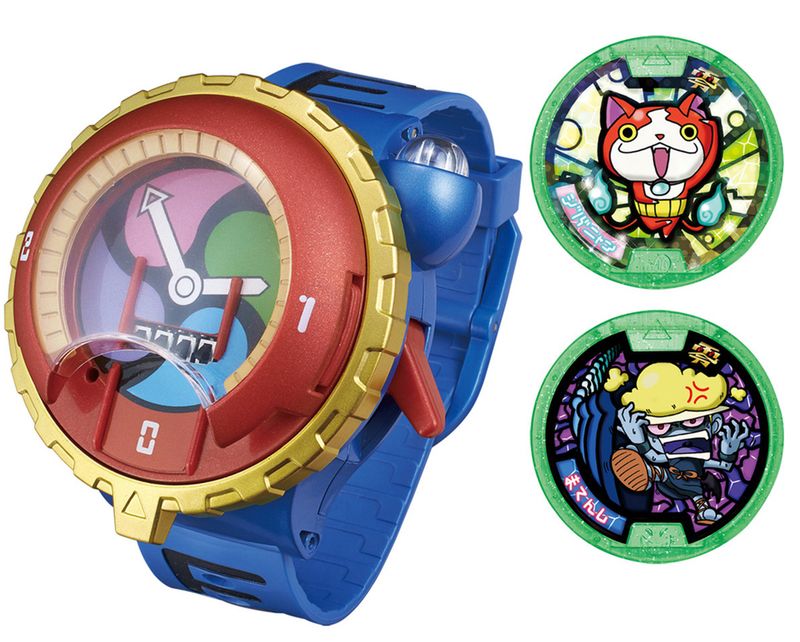 Yōkai Watch toys are a common sight on the wrists of Japanese—and soon the world's?—children. (© Jiji)
Yōkai Watch toys are a common sight on the wrists of Japanese—and soon the world's?—children. (© Jiji)
レジェンド — Rejendo. “Legend” is the nickname of ski jumper Kasai Noriaki, who, at the age of 41, was the oldest member of the Japanese team sent to compete in the Sochi Winter Olympics in February. Despite his years, Kasai captured the silver medal in the individual large-hill event and also earned a bronze in the team event in his seventh trip to the Winter Games since his debut at the 1992 games in Albertville. (As seen in our photos below, other legends from the sporting world share this moniker and were on hand at the ceremony to accept the award.)
The award ceremony tends to be a lively affair, and 2014’s was no different. Here are some photos of the proceedings:
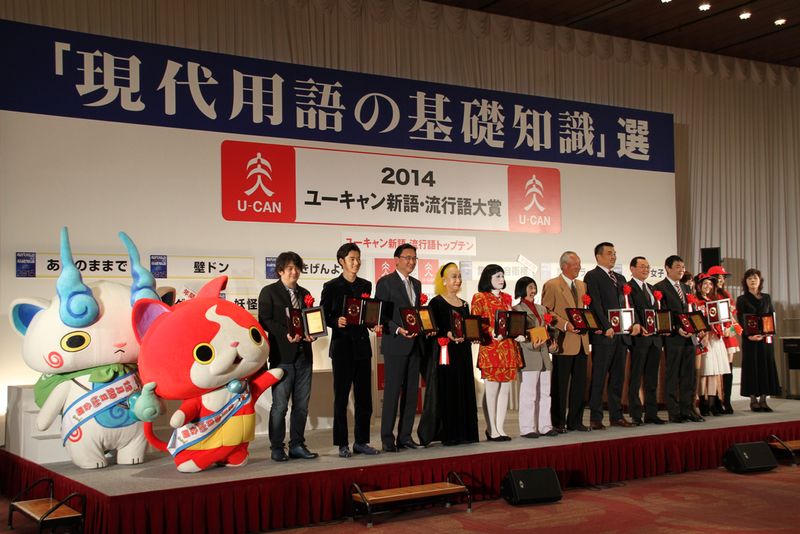 At the December 1 award ceremony, representatives for each of the finalist words gathered to accept the prizes for 2014. (The Abe administration did not send anyone to collect the top prize for shūdanteki jieiken.)
At the December 1 award ceremony, representatives for each of the finalist words gathered to accept the prizes for 2014. (The Abe administration did not send anyone to collect the top prize for shūdanteki jieiken.)
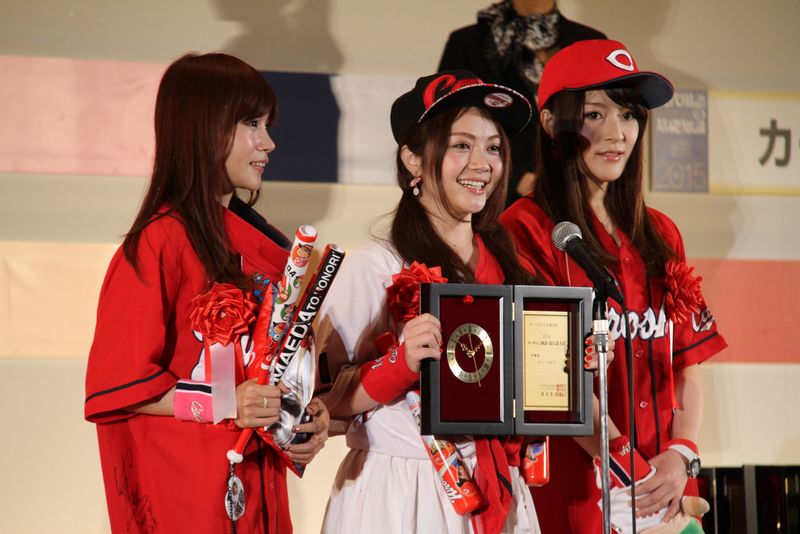 From left: Kāpu joshi Furuta Chisako, Ōi Chihoko, and Amano Megumi accept the award for the “Carp girls” term.
From left: Kāpu joshi Furuta Chisako, Ōi Chihoko, and Amano Megumi accept the award for the “Carp girls” term.
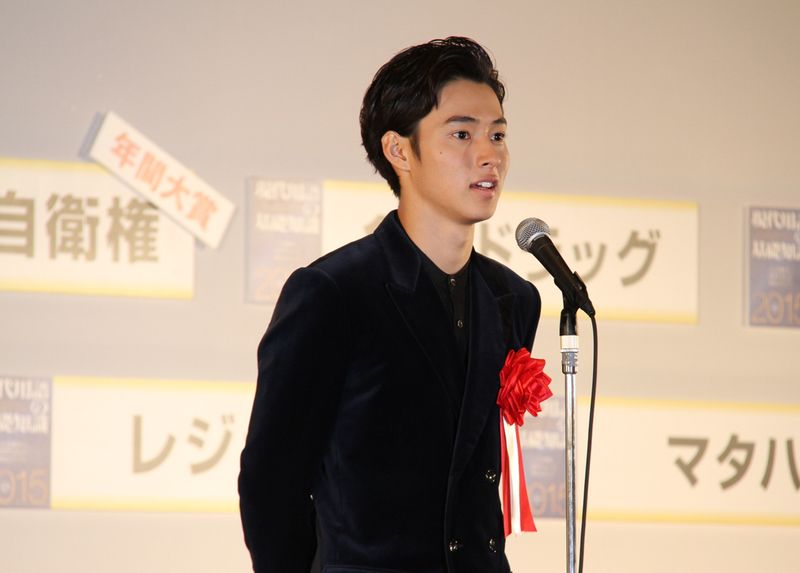 Yamazaki Kento accepts the award for kabe don. In the movie adaption of breakout comic L♥DK (Rabu dōkyo, or “Living Together in Love”), the actor’s character uses the move of putting his arm up on the wall to box in and sweet-talk the leading lady.
Yamazaki Kento accepts the award for kabe don. In the movie adaption of breakout comic L♥DK (Rabu dōkyo, or “Living Together in Love”), the actor’s character uses the move of putting his arm up on the wall to box in and sweet-talk the leading lady.
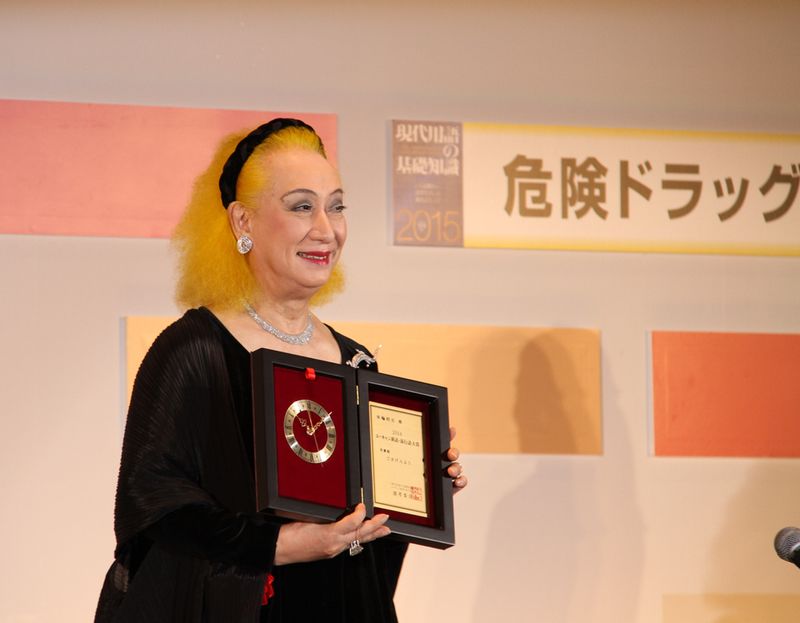 Singer and actor Miwa Akihiro used the salutation gokigen yō to end each episode of the popular NHK morning drama Hanako to An (“Hanako and Anne”), which was based on the life of the Japanese translator of Anne of Green Gables.
Singer and actor Miwa Akihiro used the salutation gokigen yō to end each episode of the popular NHK morning drama Hanako to An (“Hanako and Anne”), which was based on the life of the Japanese translator of Anne of Green Gables.
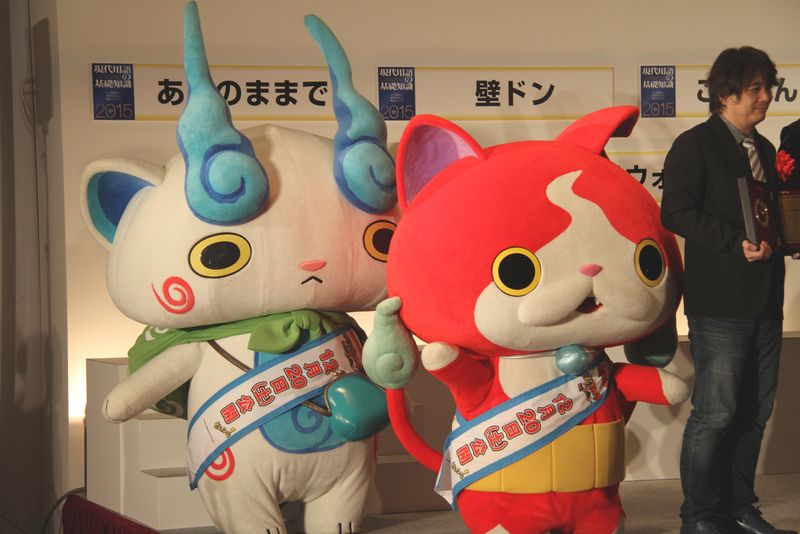 Popular Yōkai Watch characters Jibanyan, right, and Komasan.
Popular Yōkai Watch characters Jibanyan, right, and Komasan.
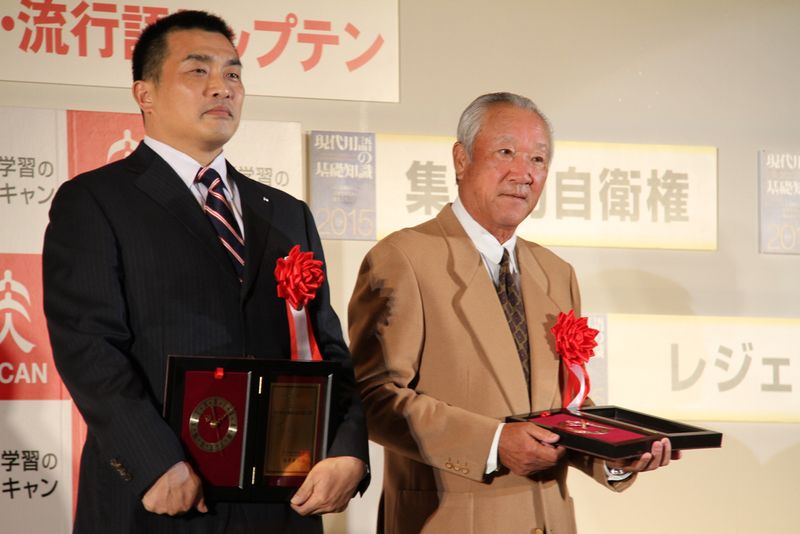 Legends: Chūnichi Dragons pitcher Yamamoto Masa, left, became the oldest player to record a win in Japan’s professional baseball league when he hurled a winning game in September at the age of 49. Professional golfer Aoki Isao, at 72, has been plying the greens of the pro circuit for over 50 years. He is still active on the senior tour. Ski jumper Kasai Noriaki was unable to attend the ceremony, but continued his rejendo status by breaking his own record as oldest jumper to log a win by taking an event during the World Cup in Finland on November 29.
Legends: Chūnichi Dragons pitcher Yamamoto Masa, left, became the oldest player to record a win in Japan’s professional baseball league when he hurled a winning game in September at the age of 49. Professional golfer Aoki Isao, at 72, has been plying the greens of the pro circuit for over 50 years. He is still active on the senior tour. Ski jumper Kasai Noriaki was unable to attend the ceremony, but continued his rejendo status by breaking his own record as oldest jumper to log a win by taking an event during the World Cup in Finland on November 29.
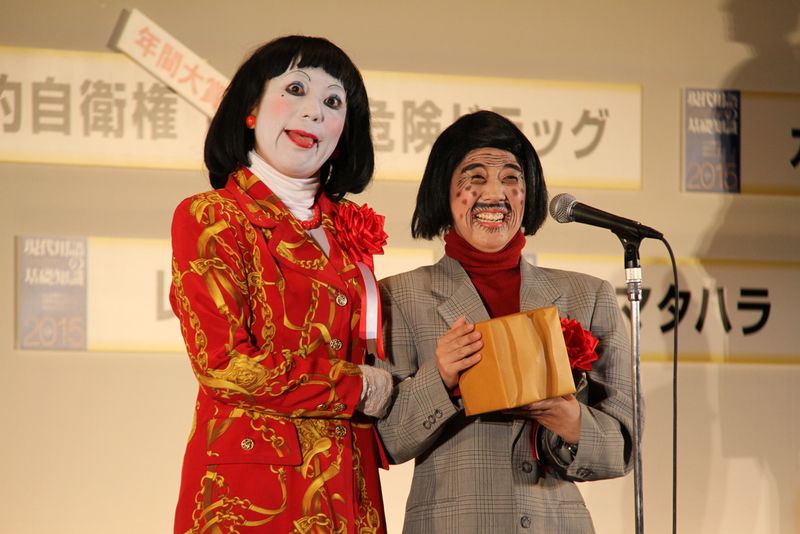 Android widow Akemi 3, played by Hashimoto Koyuki, deflects the amorous appeals of elderly Hosogai, played by Nakano Sōko. The comic duo Nippon Erekiteru Rengō won the top prize with their wildly popular catch phrase Dame yo. Dame dame.
Android widow Akemi 3, played by Hashimoto Koyuki, deflects the amorous appeals of elderly Hosogai, played by Nakano Sōko. The comic duo Nippon Erekiteru Rengō won the top prize with their wildly popular catch phrase Dame yo. Dame dame.
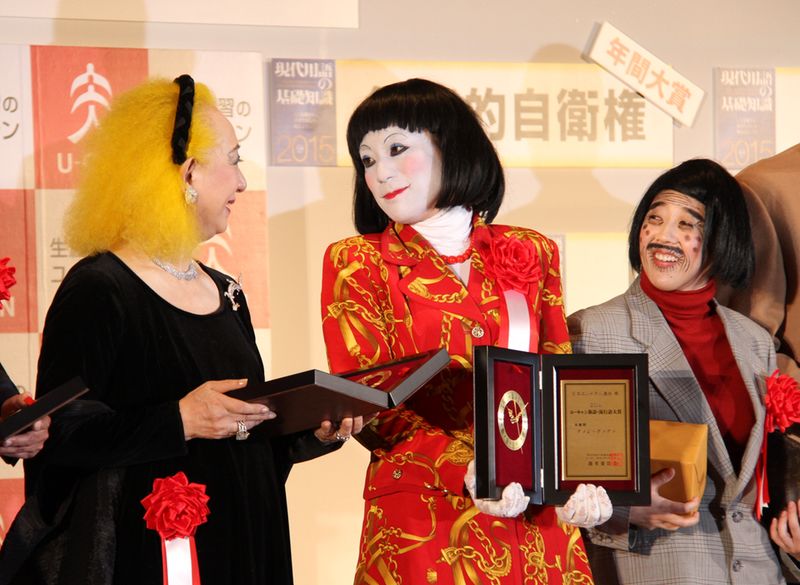 Miwa Akihiro and comedian Hashimoto Koyuki share a smile before posing for a group photo with other award recipients.
Miwa Akihiro and comedian Hashimoto Koyuki share a smile before posing for a group photo with other award recipients.
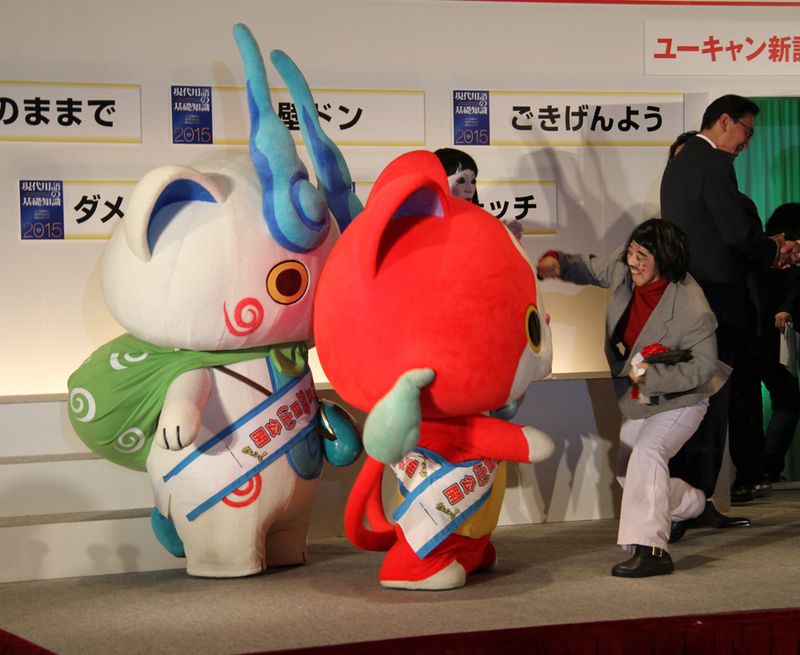 Nippon Erekiteru Rengō’s Nakano Sōko spars with Yōkai Watch character Jibanyan after the group photo session.
Nippon Erekiteru Rengō’s Nakano Sōko spars with Yōkai Watch character Jibanyan after the group photo session.